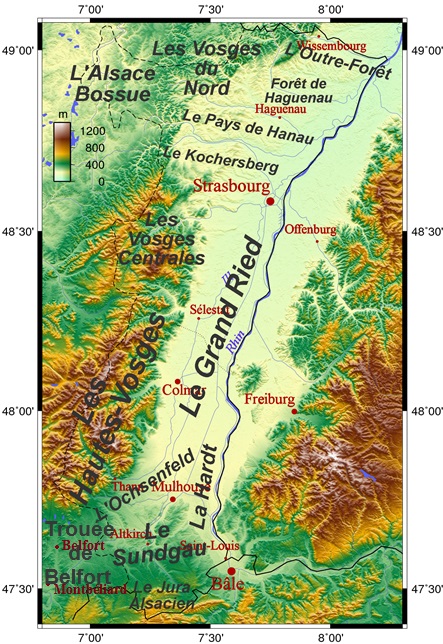Alsace Bossue on:
[Wikipedia]
[Google]
[Amazon]
 The Alsace bossue ( Alemannic and
The Alsace bossue ( Alemannic and
 The Alsace bossue ( Alemannic and
The Alsace bossue ( Alemannic and Frankish
Frankish may refer to:
* Franks, a Germanic tribe and their culture
** Frankish language or its modern descendants, Franconian languages, a group of Low Germanic languages also commonly referred to as "Frankish" varieties
* Francia, a post-Roman ...
: ''S'Gromme/S'Krumme Elsass'', German: ''das krumme Elsass/ Krummes Elsass''), is a territory of Bas-Rhin
Bas-Rhin () is a department in Alsace which is a part of the Grand Est region of France. The name means 'Lower Rhine', referring to its lower altitude among the two French Rhine departments: it is downstream of the Haut-Rhin (Upper Rhine) de ...
in Alsace
Alsace (, ; ) is a cultural region and a territorial collectivity in the Grand Est administrative region of northeastern France, on the west bank of the upper Rhine, next to Germany and Switzerland. In January 2021, it had a population of 1,9 ...
, which includes the three former cantons of Sarre-Union, Drulingen and La Petite-Pierre (today all part of the canton of Ingwiller).
Just like nearby parts of Lorraine
Lorraine, also , ; ; Lorrain: ''Louréne''; Lorraine Franconian: ''Lottringe''; ; ; is a cultural and historical region in Eastern France, now located in the administrative region of Grand Est. Its name stems from the medieval kingdom of ...
, the Alsace bossue is linguistically predominantly located into the Rhine Franconian
__NOTOC__
Rhenish Franconian or Rhine Franconian ( ) is a dialect chain of West Central German. It comprises the varieties of German spoken across the western regions of the states of Saarland, Rhineland-Palatinate, northwest Baden-Württember ...
area.
History
The current borders of this territory date back from 1793, when the County of Saarwerden was annexed by the youngFrench First Republic
In the history of France, the First Republic (), sometimes referred to in historiography as Revolutionary France, and officially the French Republic (), was founded on 21 September 1792 during the French Revolution. The First Republic lasted un ...
.
Initially, the county of Saarwerden was meant to be fragmented and distributed between the departments of Moselle
The Moselle ( , ; ; ) is a river that rises in the Vosges mountains and flows through north-eastern France and Luxembourg to western Germany. It is a bank (geography), left bank tributary of the Rhine, which it joins at Koblenz. A sm ...
, Meurthe and/or Bas-Rhin
Bas-Rhin () is a department in Alsace which is a part of the Grand Est region of France. The name means 'Lower Rhine', referring to its lower altitude among the two French Rhine departments: it is downstream of the Haut-Rhin (Upper Rhine) de ...
, but its inhabitants were against the fragmentation, and as such the project was afterwards cancelled. The county was then temporarily absorbed by the nearby districts of Moselle and Meurthe until a final decision was made. Towards the end of the year 1793, it was finally decided that the entire territory would be given to the Bas-Rhin department, essentially due to religious reasons, as the Sarrewerden county had been Protestant
Protestantism is a branch of Christianity that emphasizes Justification (theology), justification of sinners Sola fide, through faith alone, the teaching that Salvation in Christianity, salvation comes by unmerited Grace in Christianity, divin ...
since the Reformation
The Reformation, also known as the Protestant Reformation or the European Reformation, was a time of major Theology, theological movement in Western Christianity in 16th-century Europe that posed a religious and political challenge to the p ...
while Lorraine
Lorraine, also , ; ; Lorrain: ''Louréne''; Lorraine Franconian: ''Lottringe''; ; ; is a cultural and historical region in Eastern France, now located in the administrative region of Grand Est. Its name stems from the medieval kingdom of ...
(Moselle and Meurthe) had remained almost exclusively Catholic. At the same time, the Moselle department gave to Bas-Rhin the municipalities of Bouquenom and Vieux Sarverden (today Sarrewerden),Ldh/EHESS/Cassini - Notice Communale both historical capitals of the Saarwerden county, which had been enclaves of the Duchy of Lorraine
The Duchy of Lorraine was a principality of the Holy Roman Empire which existed from the 10th century until 1766 when it was annexed by the kingdom of France. It gave its name to the larger present-day region of Lorraine in northeastern France ...
or the Kingdom of France
The Kingdom of France is the historiographical name or umbrella term given to various political entities of France in the Middle Ages, medieval and Early modern France, early modern period. It was one of the most powerful states in Europe from th ...
within the county since 1697.
Another county that is often considered to be a part of Alsace bossue was the ''County of Lützelstein'' (comté de la Petite-Pierre), which belonged to the Rhine Palatinate throughout most of its existence. Although most of the county is today part of the Bas-Rhin
Bas-Rhin () is a department in Alsace which is a part of the Grand Est region of France. The name means 'Lower Rhine', referring to its lower altitude among the two French Rhine departments: it is downstream of the Haut-Rhin (Upper Rhine) de ...
department, some of its historical villages, including Achen, Berling, Bourscheid, Hangviller, Lixheim, Montbronn, Phalsbourg, Vescheim, Wintersbourg and Zilling, are today part of the Moselle
The Moselle ( , ; ; ) is a river that rises in the Vosges mountains and flows through north-eastern France and Luxembourg to western Germany. It is a bank (geography), left bank tributary of the Rhine, which it joins at Koblenz. A sm ...
department.
References